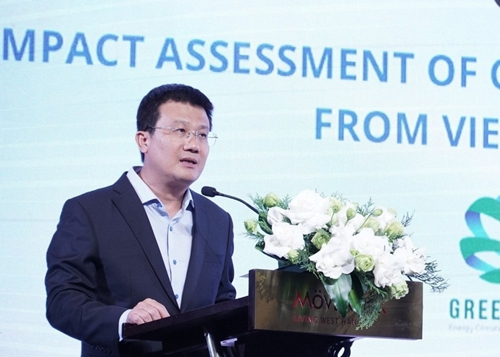Addressing the event, Nguyen Tuan Quang, Deputy General Director of the Department of Climate Change, said that to achieve global climate goals, carbon pricing tools, particularly the transfer of emission reduction outcomes and carbon credits under Article 6 of the Paris Agreement, are considered vital and effective solutions widely adopted by many countries.
    |
 |
|
Nguyen Tuan Quang, Deputy General Director of the Department of Climate Change speaks at the event. (Photo: nongnghiepmoitruong.vn) |
According Quang, Vietnam has pledged to achieve net-zero emissions by 2050 under COP26, with climate action identified as a top priority. Alongside building a domestic carbon market, the country is working with international partners on transferring emission reduction outcomes and carbon credits, seen as key to driving low-carbon technology, meeting national targets at reasonable costs, and boosting competitiveness for green growth.
To fulfil these commitments, Vietnam has built a legal framework, starting with the 2020 Law on Environmental Protection, which first introduced carbon market provisions. Decrees No.06/2022/ND-CP and No.119/2025/ND-CP set a specific roadmap for carbon market development with a pilot phase through 2028, full operation from 2029, and a trial exchange within 2025. A master plan approved by the Prime Minister details core tasks to ensure the market develops as scheduled.
On international cooperation, the Ministry of Agriculture and Environment has coordinated with relevant ministries and agencies to draft a government decree on the international exchange of greenhouse gas mitigation outcomes and carbon credits, expected to be issued in 2025.
According to Quang, the U.N. Office for Project Services (UNOPS), through the ETP, has recently provided technical support to the Department of Climate Change in assessing the impact of an emissions trading and carbon credit system in Vietnam. This serves as crucial input for finalizing the upcoming decree on international exchange of greenhouse gas mitigation outcomes and carbon credits.
This technical support aims to analyze, build models, and assess the impacts of different management options for greenhouse gas mitigation outcomes and carbon credits. The findings provide key input for the Department of Climate Change in developing and refining the legal framework for international exchange of greenhouse gas mitigation outcomes and carbon credits.
Nguyen Hong Loan, the project's head and climate policy expert at GreenCIC, noted that the study developed and assessed nine scenarios based on two main factors: the list of eligible activities for international transfer and the percentage of mitigation outcomes retained to meet Vietnam’s Nationally Determined Contribution (NDC) targets.
Experts recommend a phased approach for Vietnam, starting with a cautious trading cap of 50%. As Vietnam strengthens its domestic emission reduction capacity and builds greater confidence in meeting its unconditional targets, the cap could be raised to 70%, enabling the country to fully achieve its conditional NDC goals with international support.
Vietnam should apply a reasonable transaction fee of around 2% to generate state revenue from the carbon market. These funds should be reinvested in hard-to-abate sectors such as agriculture and forestry to ensure fairness and improve overall mitigation efficiency. At the same time, policies are needed to encourage businesses to invest in credit-generating measures in priority sectors, both to maximize contributions to NDC targets and to mitigate market price risks, thereby enhancing the competitiveness of Vietnam’s carbon credits in the international market.
Source: VNA